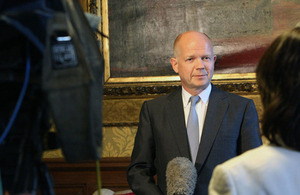Foreign Secretary discusses motion for Parliamentary debate on Syria
Foreign Secretary calls for Britain to send clear message that the use of chemical weapons cannot be tolerated.

Foreign Secretary William Hague
This evening the Foreign Secretary discussed the government’s motion for the Parliamentary debate on Syria tomorrow. In a television interview William Hague said:
The motion that we’re putting forward tomorrow reflects the Prime Minister’s recognition of the deep concerns in this country about what happened over Iraq. That is well acknowledged across all political parties in this country, and so we will be clear that we are determined to take action against war crimes, against crimes against humanity - and that is what the use of chemical weapons constitutes - but that we will also proceed as far as possible on a consensual basis. That is why we’ve been talking to the opposition in this country - as well, of course, as talking within the coalition - over the last couple of days.
And so this motion that we’re putting to the House of Commons tomorrow endorses the Government’s consistent approach that we must be prepared to take action against the use of chemical weapons by the Assad regime to deter the future use of chemical weapons. But it also reflects the desire to proceed on a consensual basis, if possible without votes that are on narrow majorities or on party lines, to ensure that there is widespread support across the House of Commons and, of course, respect for the United Nations processes as well.
The motion brings all of those together, and I hope that on that basis the House of Commons tomorrow, and Parliament as a whole, can express its strong support for maintaining the prohibition on chemical weapons in the world, but be prepared to take action on the basis of the maximum consent that can be achieved.
It is important to proceed on a consensual basis. This is a democratic country, and it is a democratic parliament and people throughout the world understand that. We are trying to take decisions on these matters in a way in which everybody’s opinions are taken fully in to account. We had a meeting of the National Security Council today, which brings together the intelligence chiefs, the Chief of the Defence Staff, and Ministers to consider all of the evidence together. One of the lessons of the last decade is that we have to do that. We will have a Cabinet meeting tomorrow where we will do a similar thing and in Parliament, as I say, we are trying to proceed with the maximum degree of consent.
This is, after all, something on which the world should be able to unite: that the use of chemical weapons in the twenty-first century is unacceptable.
And so we are making every possible effort to make sure the British Parliament can unite. So have we made an effort here to accommodate the concerns and questions of other parties? Yes we have, but I think we should regard that as something positive in such a difficult situation.
Speaking about the possibility of a further Parliamentary vote next week once discussions had taken place at the UN, the Foreign Secretary said:
That would be up to Parliament, and we will no doubt be able to come back to that question. What we will do tomorrow is clearly establish the principles of our approach. Yes we want the UN inspectors to do their work as quickly as possible. I stress - as I’ve stressed before - that it’s not actually their job to apportion blame, they are there to assess whether chemical weapons have been used. We already have our own very strong view about who is to blame: that is the Assad regime. In fact there is no plausible explanation for anybody else being to blame.
So there is from the eye-witness accounts, from the fact that the Assad regime has used chemical weapons before, has chemical weapon stocks and was bombarding this area when these crimes took place, already a huge amount of evidence. But it is understandable that people want to see what the UN inspectors say; that is completely understandable and so that is incorporated in to our motion tomorrow.
Speaking about US views on possible military action in Syria, the Foreign Secretary said:
The United States are able to make their own decisions of course. We will remain closely coordinated with them and in close touch with them as we are every day. I speak to my counterpart Secretary Kerry every day, and have done so this evening. So of course they will be able to make their own decisions, but we will continue to be determined that the world should reject the use of chemical weapons, and that the United Kingdom has a role to play in that. And so coming back for a second vote will depend on the circumstances, but we’re clear that that second vote can be held and we’re establishing the principles for that tomorrow.
And so I hope the message will go out loud and clear from Britain: that the use of chemical weapons in the twenty-first century cannot be tolerated. And that is something which people across all political parties should be able to support.
Further information
Foreign Secretary calls for strong international response to chemical attack in Syria (28 August)
Syria: UK to put forward United Nations Security Council resolution (28 August)
Follow the Foreign Secretary on facebook and on twitter: @WilliamJHague.